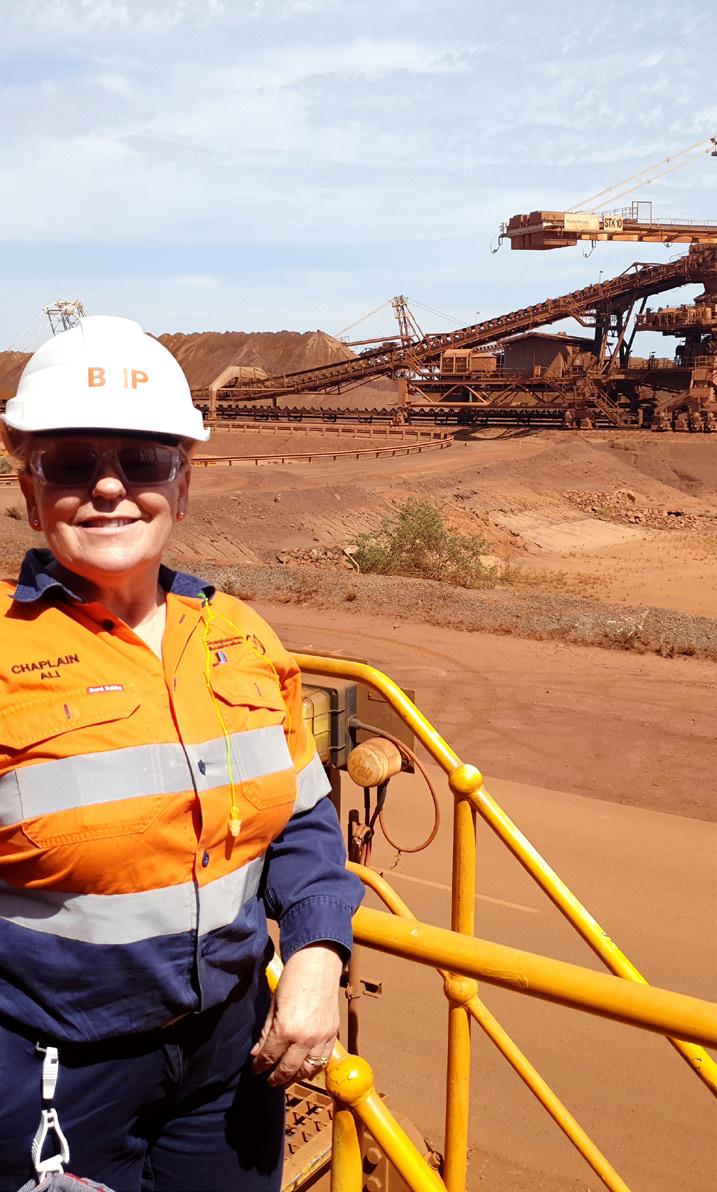
3 minute read
WHY BECOME A CHAPLAIN?
from ACC EMAG#4/2021
by ACCMag
ACC EMAG spoke to three chaplains who work as qualified chaplains after completing the Chaplaincy Certificate IV.

ALISON SHERWOOD
Q: Why did you decide to study to become a Chaplain?
ALISON: If I was to truly impact my community, I required the knowledge, the education and tools to validate my words and actions. I quickly discovered that my own experience and knowledge was only able to take me so far. The education and qualifications were the door openings and gave me a professional seat at the table. Q:
What aspects of the Chaplaincy Cert IV course did you find especially valuable that equips you for your job now?
ALISON: The course provided knowledge, understanding and structure to function as a professional Chaplain. For me personally, the areas that have provided the greatest benefit are boundary setting (without them, it is challenging for longevity) and personal protection – knowing when to step in and when step away.
Q: What do you love about your current Chaplain role?
ALISON: I love living in a community knowing that the most vulnerable have a soft place to land. It’s an absolute honour when someone allows you to hear their whispers and stories and expose their hearts to you. At the end of the day, being a conduit for an encounter with our heavenly Father and bringing the opportunity for healing and wholeness is me being a small part of Christ’s body.
Stephen Bell

Q: What prompted you to study to become a Chaplain?
STEPHEN: I felt God place on my heart the need to help those in a workplace environment, for someone whom they could trust to talk to and walk with them, and provide a holistic approach while showing Jesus’s Love in action. That’s why I chose to become a Chaplain.
Q: What aspects of the Chaplaincy Cert IV course did you find especially valuable that equips you for your job now?
STEPHEN: All subjects provided the practical skills for the Chaplain’s roles. Personally, “I’m not there to FIX IT”, and setting boundaries was valuable. The lecturers shared their chaplaincy experiences, which helped bring it to life and the exceptions of being a Chaplain for others.
Q: What do you love about your current Chaplain role?
STEPHEN: I’m currently employed as the Team Chaplain for ChaplainWatch Inc. to provide care and support for service users experiencing distress, panic attacks, anxiety, depression, and suicidal thoughts at the weekends. I also volunteer to support workplaces, providing holistic care and mental health (first responder), plus on call as a Community Crisis Chaplain for ChaplainWatch and Disaster Recovery.
What I Love about what I do is working with people with the same DNA of Chaplaincy and being able to bring the presence of God by showing Jesus’s love for me to them, in action to meet their needs. Bringing the present of God into whatever the situation.
GLENN BERRY

Q: What prompted you to study to become a Chaplain?
GLENN: In 2011, I participated in a 40-hour, introductory course for hospital chaplaincy; and then volunteered at the district hospital and church youth support home. Soon after this, a visiting pastor gave me a word that I would be a prison chaplain. In 2014, I heard about the Certificate !V in Chaplaincy at Alphacrucis. Prayerfully, I felt that this was the direction the Lord was guiding me into.
Q: What aspects of the Chaplaincy Cert IV course did you find especially valuable that equips you for your job now?
GLENN: There are many valuable skills that I apply in my daily role. The skills of attentive and reflective listening are especially crucial, as well as understanding empathy. You can be at risk of being affected by vicarious trauma so it is vital to learn about and apply self-care. Learning how to “know your role, know your limits and know when to refer” are essential to my everyday experience in the gaol.
Q: What do you love about your current Chaplain role?
GLENN: I am a full-time Prison Chaplain at the South Coast Correctional Centre. There are currently 190 male inmates and around 40 staff that I support at the Centre. I am privileged to be on this journey to assist them through their many difficult challenges, such as personal family concerns, grief and loss, relationship fractures and, most important, their spiritual and personal development and growth. I gain a great deal of satisfaction in seeing the transformation through the love of Christ upon their lives.










